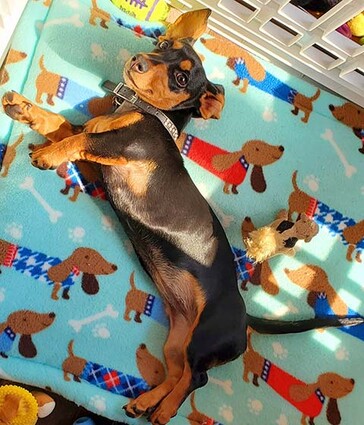Help your dog adjust when returning to work
Last updated 2/23/2021 at Noon

Jodi Schneider
Ruby stays in a specific area when her pet parent leaves for work — a “playpen” area to keep her and the furniture safe. She is used to it and enjoys the nine-square-foot area full of safe toys and treat-filled Kongs.
If you worked at home during the pandemic, your dog may have gotten used to constant attention. Millions of dogs accepted the constant company of their human companions who were home all day — quite easily.
Being alone when pet parents return to work after months at home will pose challenges for dogs. You can take steps to minimize the difficulties for them.
If you have any extra time before returning to work away from home, make use of it to prepare your pooch.
You can begin by leaving the house more frequently, increasing the duration each time. Do so even if you’re going places you would normally bring your dog — like to the park, to the home improvement store, to get coffee, or to eat out on a restaurant’s patio. This will help your pet get used to the idea of you being away, and that you always come back.
Routine is comforting to most dogs, so put them on a consistent schedule that is as close as possible to the one they will soon be on. Getting dogs accustomed to the flow of life after you return to work will lessen the shock and make it easier for them to adjust.
Waking up and going to bed at the same time daily and consistently feeding them at the same time as you will on work days are easy steps to help your dog get used to the new routine.
When you do return to work, make sure your dog gets plenty of physical exercise. Take your dog out for a walk or a run before you leave. Providing your dog an opportunity to exercise at the start of the day makes it easier for him to relax until you come home.
Your dog has learned how to stay active indoors with the family being home over the past months; now he needs to learn how to stay active on his own.
Mental exercise is important, and leaving your dog with interactive puzzle toys, or a new and exciting chew toy, can encourage independence while keeping them too busy to be bored. Be careful not to leave them with a chew toy that can break into small pieces and become a choking hazard, or digestive system obstruction. If leaving your pet out to freely roam the house isn’t working, consider confining them to a crate or play area that is gated.
Leave a blanket you have used or a T-shirt you have worn so that the familiar smell of you can comfort them in your absence.
Before you leave, and after you get home, you can also spend time playing with your furry friend; it’s the best way to spend quality time with him. It combines fun, exercise of both the mental and physical kind, and helps strengthen your relationship.
You can also help your dog release some of the pent-up energy from the day by exploring new parks and streets in the community, and even help support local businesses by stopping by pet-friendly ones. New sights, sounds, and smells will provide your dog with good mental stimulation.
Another option, if you have a high-energy dog, is to hire a dog walker to give your furry friend some physical and mental exercise, as well as some social contact during the day.
Whether you play hide-and-seek, tug, fetch, or chase games, or just go for a walk, your dog will enjoy every minute of the time you spend together.
If, despite your best efforts, your dog just isn’t adjusting to being home alone again (or you may have a new rescue that isn’t handling it well), and you feel like you could benefit from behavioral assistance, dog training with a professional animal behaviorist may be a consideration. A trainer can help you work with your dog on counter-conditioning their anxiety response to being left alone.
Many people need to work and going to work allows you to buy food, treats, toys and veterinary care for your dog, so don’t feel guilty about it. What’s important is that your dog has a happy life. Think quality over quantity, and spend time doing activities that are fun and satisfying for you both.
















Reader Comments(0)